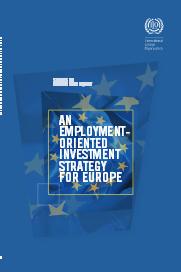Escudero, V., Horne, R., Kühn, S., Milasi, S., López Mourelo, E., Pignatti, C. & Silvander, J. (2015) “An Unemployment-Oriented Investment Strategy for Europe“, International Labour Organization (ILO) Research Department, Studies on Growth with Equity, January.
Key Policy Options and Considerations
Against a backdrop of sluggish economic conditions and continued weak job creation, the Investment Plan proposed by the European Commission President Jean-Claude Juncker would provide a rapid economic stimulus that would foster Europe’s competitiveness at the same time as boosting much-needed employment creation. The main finding of this ILO report is that, if careful consideration is given to the design of the programme and its allocation, over 2.1 million net new jobs would be created by mid-2018.
A call for action:
- Stimulating investment is a step in the right direction to boost job creation. Since the height of the crisis, investment in the EU-28 remains well below pre-crisis levels and is too low to make a significant dent on unemployment and under-employment. The unemployment rate, at 9.7 per cent in the third quarter of 2014, is close to 3 percentage points above the level reached in the same quarter of 2007. Moreover, half of those unemployed have been without a job for more than a year. By comparison, in the United States of America, for example, investment has recovered by more than 2 percentage points and the unemployment rate has fallen by more than 3 percentage points since 2009.
- The Investment Plan comes at a time when the growth outlook is deteriorating. Between the Spring and Autumn 2014 European Commission projections, GDP growth was revised downwards for 2015 in 22 of the 28 economies. In the EU-28 this translates into a downward revision of 0.5 percentage points from 2.0 to 1.5 per cent, with the outlook weakening significantly in some of the larger EU-28 economies, such as France and Germany. Higher investment is essential to reverse that trend, improve competitiveness and create more and better jobs.
Relevant posts:
- Beblavý, Μ., Gros, D. & Maselli, I. (2015) “Reinsurance of National Unemployment Benefit Schemes“, Social welfare policies, CEPS Working Documents, Centre for European Policy Studies, 08 January.
- Katz, F. L., Kroft, K., Lange, F. & Notowidigdo, M. (2014) “Addressing long-term unemployment in the aftermath of the Great Recession“, VoxEU Organisation, 03 December.
- Dolls, M., Fuest, C., Neumann, D. & Peichl, A. (2014) “An Unemployment Insurance Scheme for the Euro Area? A Comparison of Different Alternatives using Micro Data“, Centre for European Economic Research (ZEW), Discussion Paper No. 14-095, 28 October.




